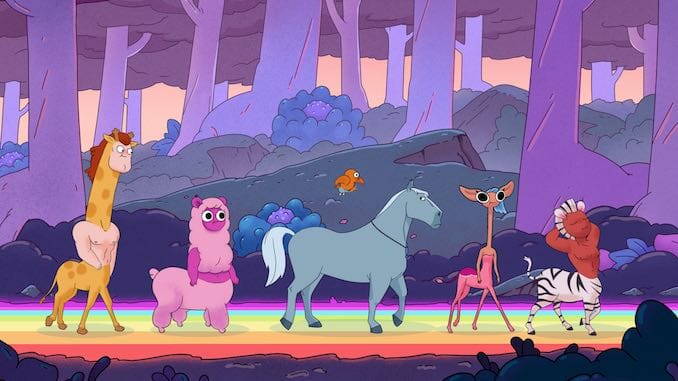Netflix’s Kid-Friendly Centaurworld May Be Addressing Suicide in a Profound Way
Photo Courtesy of Netflix
TW: Discussions of suicide and suicidal ideation. For those seeking help, the National Suicide Prevention Hotline is (800) 273-8255. There is also a chat option.
If you haven’t heard of or seen Centaurworld, it’s no surprise. It’s one of the million shows produced by Netflix, and seems to have been a victim of the rapid-pace release of their endless content. By the time it had any potential to gain a large following, it was buried by the million other Netflix movies and shows that have come out since.
Perhaps because of its cutesy title and colorful setting, most viewers have assumed Centaurworld is an inoffensive, unchallenging show to put on in the background so your kids can leave you alone while you work from home. And I’m sure that for many, that’s what the show serves as; but I’m sad that more people haven’t been able to give the series their full attention, because it’s genuinely one of the best pieces of media I’ve consumed in 2021.
The traditionally animated series stars a talking warhorse named Horse (Kimiko Glenn), who gets separated from her rider—named Rider (Jessie Mueller), of course—and finds herself in a colorful paradise in which all creatures are half-animal and half-human, hence the title Centaurworld. The show thrives in the whiplash between its dark, at times disturbing themes and its childish, friendly atmosphere, which allows it to go back and forth between the two extreme tones for both comedic and chilling effect. It also utilizes Broadway-style music with real Broadway actors who take the show to a whole new level. I never thought I would be crying or getting goosebumps over a show in which a half-giraffe has farts voiced by Tony Hale that give him encouragement, but I absolutely did and I have no regrets.
I could write an essay on each individual episode, but I want to highlight the most shocking, profound moment I experienced in the show. In Episode 8, “Ride the Whaletaur Shaman!” Horse seeks out the final shaman (Rosalie Craig) in order to retrieve her last MacGuffin, only to be eaten by the half-whale in a misunderstanding, Jonah-style.
However, as is the case for most of the storylines in Centaurworld, there are a lot of metaphors at play. Some are more clear-cut, such as Horse’s changing features—including a joking tail voiced by Paul F. Tompkins—being a metaphor for puberty. But the Whaletaur is more abstract.
When I first watched through the series with my partner, I uncomfortably commented, “Are they talking about… suicide?” and she immediately confirmed that she was thinking the same thing. I don’t know what the creators intended and frankly I don’t want to know, because I think it can be more interesting to walk away with my own interpretations rather than a prescribed one. But if not suicide, the Whaletaur could represent escapism in general, and if not through death, then through withdrawal, drugs, or even perhaps institutions. For a TV-Y7 show, that’s huge.
-

-

-

-

- Curated Home Page Articles By Test Admin October 21, 2025 | 3:10pm
-

- Curated Home Page Articles By Test Admin October 21, 2025 | 2:57pm
- Urls By Test Admin October 21, 2025 | 2:57pm
- Curated Home Page Articles By Test Admin October 21, 2025 | 2:55pm
-

-

-

-

-

-

-

-

-

-

-

-

-

-

-

-

-

-

-

-

-

-

-

-

-

-

-

-

-

-

-




































